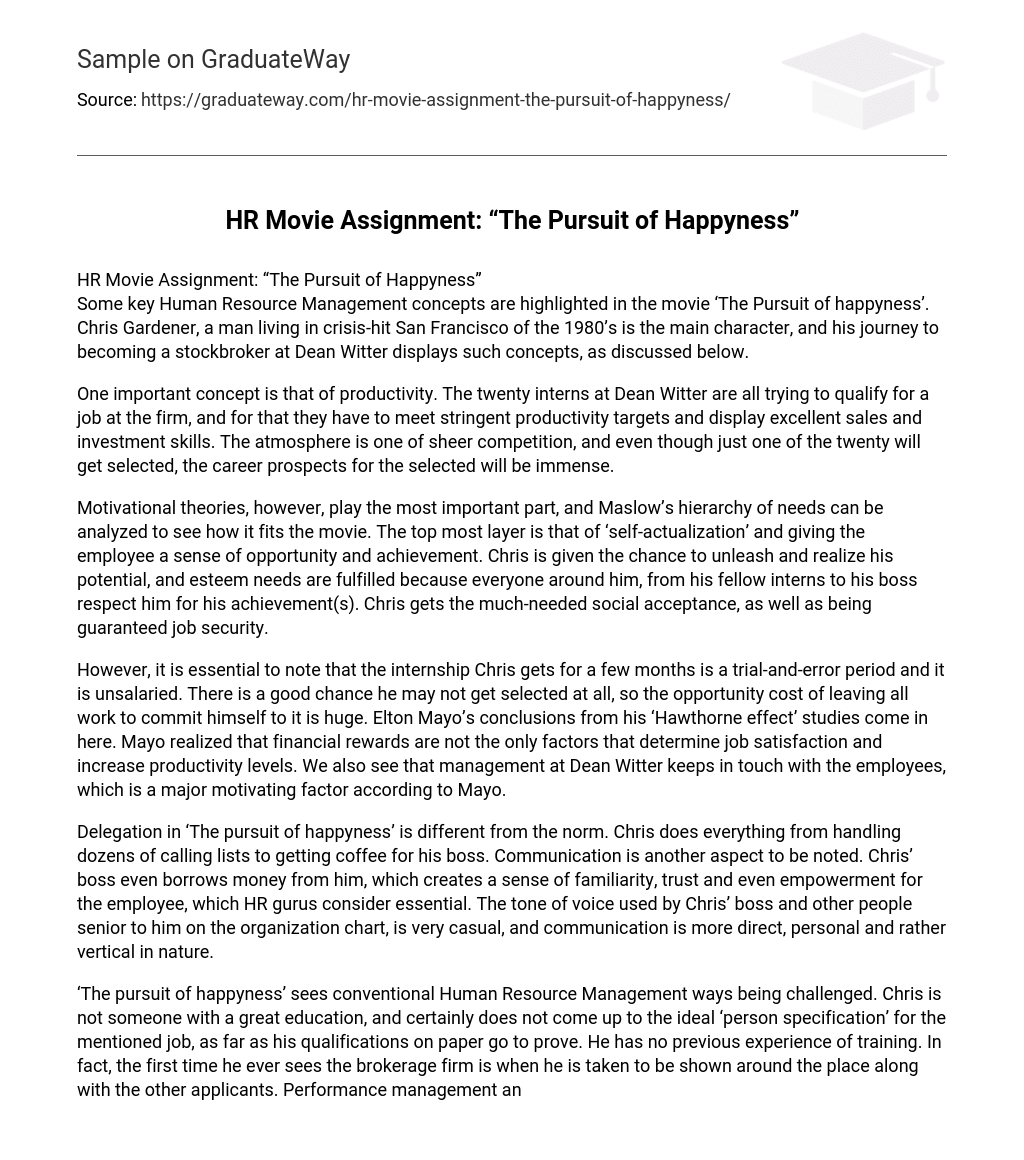Some key Human Resource Management concepts are highlighted in the movie ‘The Pursuit of Happyness’. Chris Gardener, a man living in crisis-hit San Francisco of the 1980’s is the main character, and his journey to becoming a stockbroker at Dean Witter displays such concepts, as discussed below.
One important concept is that of productivity. The twenty interns at Dean Witter are all trying to qualify for a job at the firm, and for that they have to meet stringent productivity targets and display excellent sales and investment skills. The atmosphere is one of sheer competition, and even though just one of the twenty will get selected, the career prospects for the selected will be immense.
Motivation theories, however, play the most important part, and Maslow’s hierarchy of needs can be analyzed to see how it fits the movie. The top most layer is that of ‘self-actualization’ and giving the employee a sense of opportunity and achievement. Chris is given the chance to unleash and realize his potential, and esteem needs are fulfilled because everyone around him, from his fellow interns to his boss respect him for his achievement(s). Chris gets the much-needed social acceptance, as well as being guaranteed job security.
However, it is essential to note that the internship, Chris gets in a few months is a trial-and-error period and it is unsalaried. There is a good chance he may not get selected at all, so the opportunity cost of leaving all work to commit himself to it is huge. Elton Mayo’s conclusions from his ‘Hawthorne effect’ studies come in here. Mayo realized that financial rewards are not the only factors that determine job satisfaction and increase productivity levels. We also see that management at Dean Witter keeps in touch with the employees, which is a major motivating factor according to Mayo.
Delegation in ‘The pursuit of happiness is different from the norm. Chris does everything from handling dozens of calling lists to getting coffee for his boss. Communication is another aspect to be noted. Chris’ boss even borrows money from him, which creates a sense of familiarity, trust and even empowerment for the employee, which HR gurus consider essential. The tone of voice used by Chris’ boss and other people senior to him on the organization chart, is very casual, and communication is more direct, personal and rather vertical in nature.
‘The pursuit of happiness sees conventional Human Resource Management ways being challenged. Chris is not someone with a great education, and certainly does not come up to the ideal ‘person specification’ for the mentioned job, as far as his qualifications on paper go to prove. He has no previous experience of training. In fact, the first time he ever sees the brokerage firm is when he is taken to be shown around the place along with the other applicants. Performance management and supervision is very strict at the firm.
Nevertheless, Chris is given the chance due to his self-determination and intelligence that goes beyond the textbook. He has poor investment skills, as can be seen from his salesman days, but the employers have an equal-opportunity policy and so Chris shall get the deserved chance to prove himself with the other interns. Ideas of social stratification, mobility and non-discrimination policies are discussed, as Chris is a black man, uneducated but wanting to climb up the social ladder.
This could not be highlighted better than in the scene where Chris comes to meet the boss, covered in paint and without a shirt, because he has no clothes. Whilst this would normally be considered peculiar and unacceptable the Dean Witter panel accepts the humor of it all and even Chris’ witty remarks to avoid embarrassment. They seem to realize that, when recruiting, some factors (like socio-economic background and physical appearance) are irrelevant as compared to others (such as ability, passion and a sense of determination).
There is no exceptional care given to Chris. He has to follow the same rules such as those for absenteeism, performance and accountability. He finally wins the job at Dean Witter due to sheer hard work and capability, and the employers respect that. Chris not only has to meet the productivity levels, he also has to sit for special job-related exams which again goes to show the strict criterion the human resource team at Dean Witter follows. These, thus, are some of the Human Resource concepts found in the movie ‘The Pursuit of happiness.
References
- Stimpson, P., (2002) Business Studies. United Kingdom: Cambridge University Press
- Free Management Library (2008). Retrieved 9th September 2008 from:
- www.managementhelp.org





